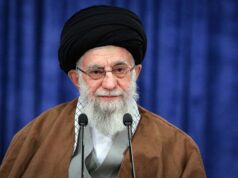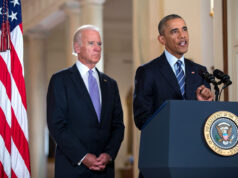The UN Security Council imposed a fourth round of sanctions against Iran yesterday over its nuclear program that the West suspects is aimed at developing WMD. It passed after five months of negotiations between the United States, Britain, France, Germany, China and Russia, and received 12 votes in favor, making it the least supported of all previous resolutions adopted on Iran since 2006. Brazil and Turkey, upset at the West’s dismissal of a nuclear swap deal they offered Tehran last month, voted against the resolution. Lebanon, where the Iranian-backed terrorist group Hezbollah is in government, abstained.
 U.S. President Barack Obama said the new resolution imposes “the toughest sanctions ever faced by the Iranian government, and it sends an unmistakable message about the international community’s commitment to stopping the spread of nuclear weapons.” However, they are not the “crippling” sanctions that U.S. Secretary of State Hillary Clinton vowed to pursue last year if U.S. efforts at engagement failed.
U.S. President Barack Obama said the new resolution imposes “the toughest sanctions ever faced by the Iranian government, and it sends an unmistakable message about the international community’s commitment to stopping the spread of nuclear weapons.” However, they are not the “crippling” sanctions that U.S. Secretary of State Hillary Clinton vowed to pursue last year if U.S. efforts at engagement failed.
While the new sanctions freeze the assets of 40 companies and organizations, and ban Iran from pursuing “any activity related to ballistic missiles capable of delivering nuclear weapons,” investing in nuclear-related activities, and buying eight categories of heavy weapons; regrettably, they do not affect Tehran’s oil exports, the lifeblood of the Islamic regime, and they fall short of imposing tough financial and shipping measures. Indeed, these harsh efforts, proposed by the U.S. and its allies, were watered down for the purposes of gaining Russian and Chinese support. For example, the sanctions do not forbid Russia from delivering S-300 air-defense missiles to Iran, which would substantially increase the latter’s defense capability.
Iranian President Mahmoud Ahmadinejad dismissed the sanctions as “annoying flies” and as useless as “used tissues.” Alaeddin Boroujerdi, the leader of the Iranian parliament’s National Security and Foreign Policy Committee, described the sanctions as “political, illegal and illogical” and said Iranian lawmakers would “begin a revision of Iran’s relations” with the International Atomic Energy Agency.
In effect, Ahmadinejad is correct. The sanctions, which fail to target Iran’s oil and gas industry or require shipment inspections on the high seas, are, for all intents and purposes, feckless. Moreover, there’s reason to believe insufficient enforcement will plague this most recent round of sanctions, as it has done to others. Indeed, it is hard to see how this new round of sanctions will alter the behavior of the Iranian regime.





